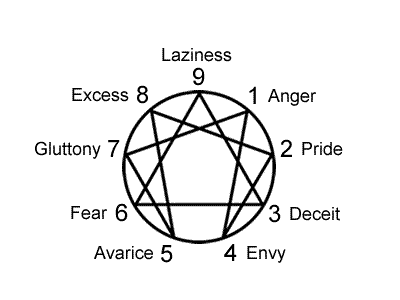Enneagram Passions: The emotional energy supporting ego fixation

Claudio Naranjo placed great emphasis on the passions as he evolved Ichazo's ego-types into the Enneagram personality types as we know them today.
Oscar Ichazo's Enneagram of Passions lies at the heart of the Enneagram personality types. Whereas the fixations describe the intellectual part of the ego, the passions are described as the emotional part of the ego that supports the fixation.
The passion appears when the corresponding virtue is lacking. The passions were described by some early teachers of the Enneagram personality types as the Enneagram sins (7 deadly sins + 2).
Ichazo's original passions
Taken from a book called Transpersonal Psychologies edited by Charles T. Tart, the descriptions of the passions below come from John C. Lilly and Joseph E. Hart who attended the 1970 Arica retreat with Oscar Ichazo.
- Anger - Again the ego will keep the person in resentful anger because he is not perfect, nor are the people around him.
- Pride - The Ego-Flattery is dependent upon the approval and applause of others, and he works hard to get them. The constant approval and flattery of others produce Ego Pride.
- Deceit - One who wants to be known for his accomplishments, positions of influence, and efficiency finds it difficult to admit anything that might mar his public image, so he often is forced into deceit to protect his ego.
- Envy - The Ego-Melancholy person, hoping for the perfect mate or situation in order to feel really real and fulfilled, tends to think most others have achieved this and, of course, is envious of their seeming happiness and earthiness.
- Avarice - Anonymity and security are important to the Ego-Stinge in order that he can safely watch the world from the peephole of his hiding place. Not only is he avid for the means to maintain his corner, he also is greedy for knowledge of what is going on in life, so that he can feel alive.
- Fear - There is a necessary instinctive fear of dangerous situations in order to safeguard our physical existence. We wouldn’t last long without it. But for the Ego-Coward, all of life is threatening. Enemies surround him, so he must always be on the alert and find someone stronger to protect him. Though such constant fear is painful, yet it is familiar and safe. To live without it would leave one too vulnerable to unexpected attack.
- Gluttony - If a little of something is pleasant, then an unlimited amount should bring unheard-of pleasures, so the Ego Plan feels. This projection of present enjoyment into future ecstasy through more and more of the same is a recurring emotional reaction to the good, though each time it ends in uncomfortable satiation and physical distress.
- Excess - The person seeking justice and truth very often overdoes his vengeance in his great moral indignation at injustice. Just as he can punish too severely one who he thinks has wronged him, he can be even more punishing to himself when he feels he has failed in justice. Often he will do physical damage to himself.
- Laziness - For the ego-indolent, the ego will persuade him to be very lazy in searching for his essence, though he may be hyperactive in finding ways to avoid working toward his essence.
The passions and the personality types
In relation to the Enneagram personality types the passions can be better understood as representing an underlying energy in support of the personality type. The labels used for the passions can't simply be understood through the common dictionary definition however and need a reinterpretation that aligns with the personality types.
Type 1: Anger is an energy that corrects and improves what's unacceptable. "It's primarily directed at myself and secondarily at others and the world at large."
Type 2: Pride is an inflated feeling of self-importance in the lives of others. "Others need me because I uniquely understand and can meet their needs and desires."
Type 3: Deceit involves taking on a persona that appeals to an intended audience. "I have difficulty knowing who I am separate from the image I'm presenting."
Type 4: Envy is a one-sided comparison between the positives of others and the negatives of oneself. "What's lacking in me that I don't have what they have?"
Type 5: Avarice is a hoarding of resources and minimizing of needs in order to avoid intrusions. "I can avoid entanglements by managing my resources."
Type 6: Fear arises from a sense of uncertainty and doubt within. "I scan others and the world around me to locate dangers and find something to reassure me."
Type 7: Gluttony of the mind is the pull felt toward interesting possibilities. "Why get mired in boredom or discomfort when pleasurable alternatives are available?"
Type 8: Excess of expansive energy that needs to be released through activity and expression. "This energy feels natural for me but I may have to sit on it when others find it too much."
Type 9: Laziness is a difficulty with defining and accomplishing goals. "I tend to go along with what others are doing and lose myself in routine and comfort."
Click here for the Complete Guide to the Enneagram.
This free guide explains- the nine Enneagram personality types
- the many type variations within type
- where the types came from (origins and history)
- how the types use the Enneagram symbol
Click here for Enneagram tests.
These free tests help you find your- primary type
- candidate types
- preferred wing
- intinctual subtype
- instinctual variant stacking
- center types (gut, heart, and head)
- tri-center with wings